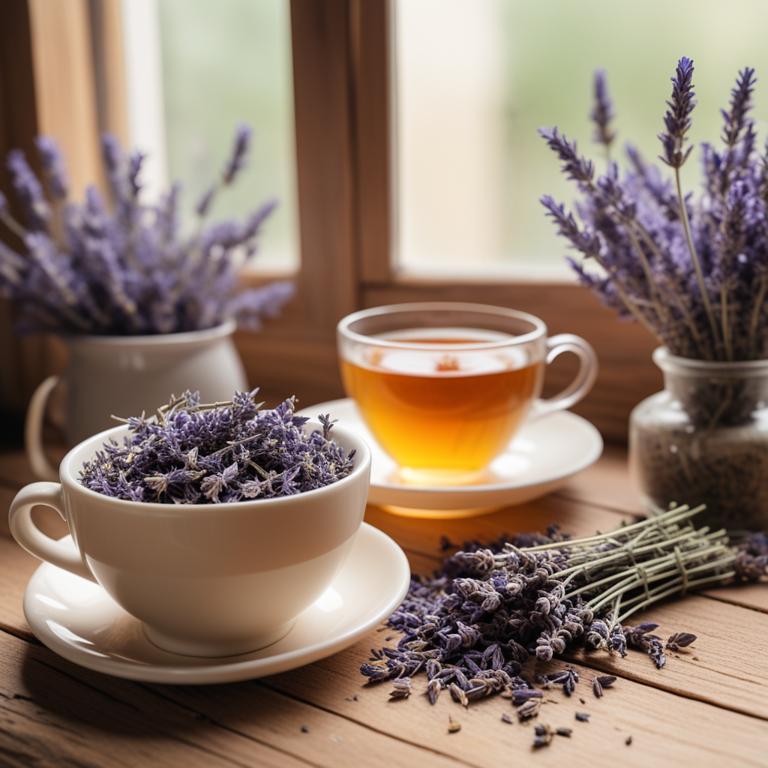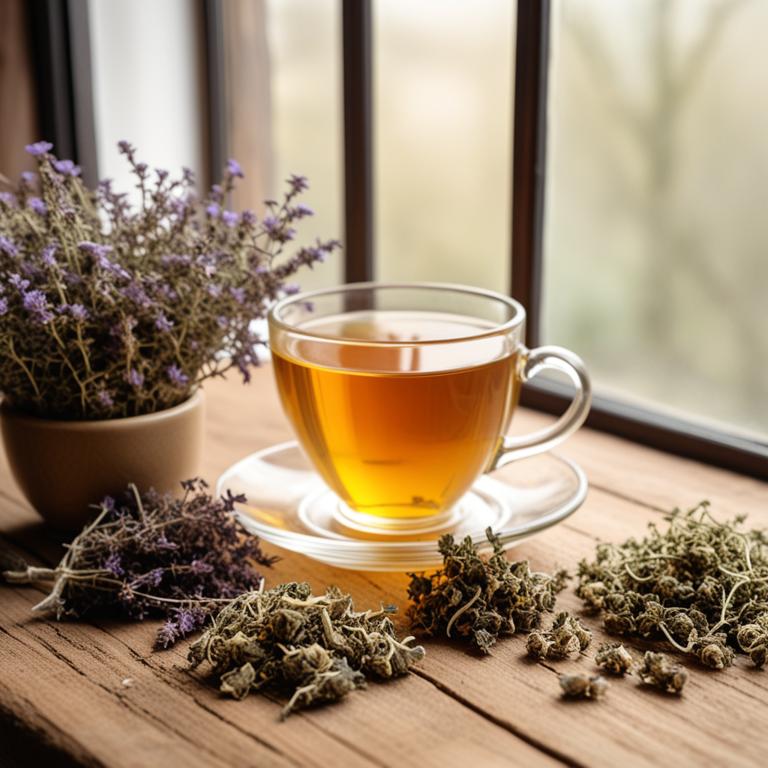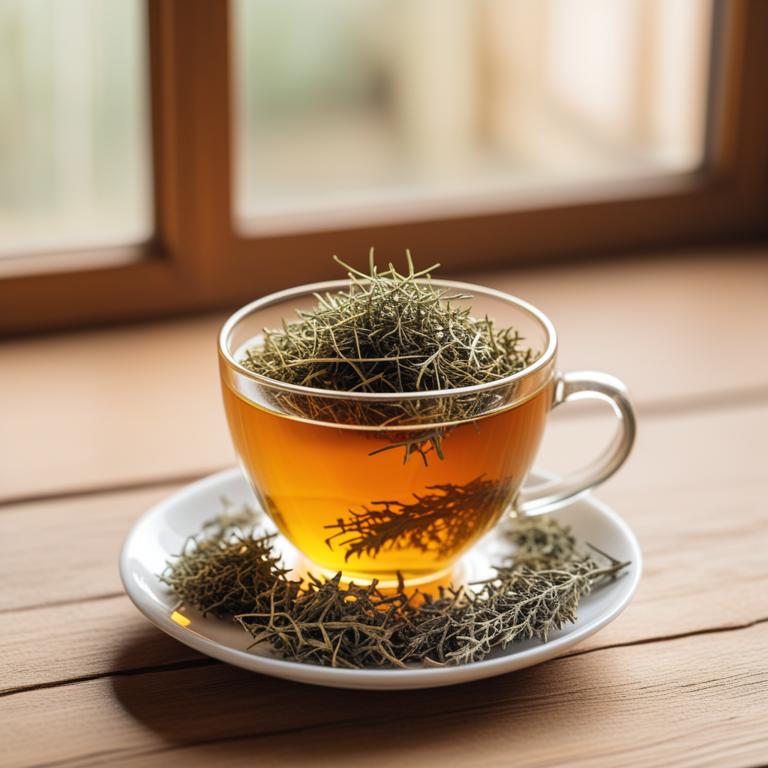9 Best Herbal Teas For Asthma

Herbal teas for Asthma are a type of natural remedy that involves brewing and consuming teas made from various herbs to alleviate symptoms of asthma.
These herbal teas have been used for centuries to treat asthma due to their anti-inflammatory, antispasmodic, and expectorant properties, which help to relax airways, reduce inflammation, and loosen mucus, making it easier to breathe.
Examples of herbal teas that have been used to treat asthma include thyme tea, which contains compounds that help to relax airways and reduce inflammation; eucalyptus tea, which has decongestant properties that help to clear mucus from the airways; peppermint tea, which has anti-inflammatory properties that help to reduce swelling in the airways; ginger tea, which has anti-inflammatory properties that help to reduce inflammation and relax airways; licorice root tea, which has anti-inflammatory properties that help to reduce inflammation and soothe the airways; and nettle tea, which has anti-inflammatory and expectorant properties that help to reduce inflammation and loosen mucus.
By incorporating these herbal teas into their daily routine, individuals with asthma can experience relief from symptoms and improve their overall lung function.
According to "The Journal of asthma : official journal of the Association for the Care of Asthma", teas for asthma may be useful in treatment due to benefits reported from various herbs used as primary or adjunctive treatments in studies reviewed.
Below there's a list of the 9 best herbal teas for asthma.
- 1. Thymus serpyllum teas
- 2. Foeniculum vulgare teas
- 3. Zingiber officinale teas
- 4. Ephedra sinica teas
- 5. Anisomeles malabarica teas
- 6. Rosmarinus officinalis teas
- 7. Lavandula angustifolia teas
- 8. Melissa officinalis teas
- 9. Curcuma longa teas
Also you may be interested in...
TODAY'S FREE BOUNDLE
Herb Drying Checklist + Herbal Tea Shopping List + Medicinal Herbs Flashcards
Enter you best email address below to receive this bundle (3 product valued $19.95) for FREE + exclusive access to The Aphotecary Letter.
$19.95 -> $0.00
1. Thymus serpyllum teas

Thymus serpyllum teas have been traditionally used to help alleviate symptoms of asthma due to their anti-inflammatory and bronchodilatory properties.
The herbal preparation contains bioactive constituents such as thymol, carvacrol, and borneol, which have been shown to help relax airway muscles, reduce inflammation, and improve lung function.
By consuming Thymus serpyllum teas, individuals with asthma may experience relief from symptoms such as wheezing, coughing, and shortness of breath, ultimately improving their quality of life.
The benefits of using Thymus serpyllum teas to treat asthma include natural and non-invasive relief, reduced reliance on conventional medications, and minimal side effects.
2. Foeniculum vulgare teas

Foeniculum vulgare teas, derived from the seeds of the fennel plant, have been traditionally used to treat asthma due to their bronchodilatory properties, which help to relax and dilate the bronchial muscles, thereby improving lung function and reducing inflammation.
The bioactive constituents of Foeniculum vulgare teas, including anethole, limonene, and fenchone, have been shown to possess anti-inflammatory and antioxidant properties, which contribute to their therapeutic effects on asthma.
By reducing airway inflammation and oxidative stress, Foeniculum vulgare teas help to alleviate symptoms of asthma, such as wheezing, coughing, and shortness of breath.
Regular consumption of Foeniculum vulgare teas has been found to be beneficial in managing asthma, improving quality of life, and reducing the need for medication.
3. Zingiber officinale teas

Zingiber officinale teas, also known as ginger tea, have been traditionally used to treat asthma symptoms due to their anti-inflammatory and bronchodilatory properties.
The bioactive constituents of ginger tea, such as gingerols and shogaols, help to reduce inflammation and relax airway muscles, making it easier to breathe.
The benefits of ginger tea in treating asthma include improved lung function, reduced symptoms of wheezing and coughing, and enhanced overall respiratory health.
Regular consumption of Zingiber officinale teas may also help to reduce the frequency and severity of asthma attacks, providing relief to individuals suffering from this chronic condition.
Related Study
According to "The Journal of asthma : official journal of the Association for the Care of Asthma", Zingiber officinale teas for asthma may be beneficial, as indicated in the study which reported benefits from most of the herbs used, including Ayurvedic herbals, but the study quality was mixed and safety information was limited.
4. Ephedra sinica teas

Ephedra sinica teas have been traditionally used to treat asthma due to their bronchodilatory properties, which help to relax the airway muscles and improve breathing.
The bioactive constituents, such as ephedrine and pseudoephedrine, found in Ephedra sinica teas, work together to increase lung function and reduce inflammation, thereby alleviating asthma symptoms.
By stimulating the beta-adrenergic receptors in the lungs, Ephedra sinica teas help to increase the flow of air in and out of the lungs, making it easier to breathe.
The benefits of using Ephedra sinica teas to treat asthma include improved lung function, reduced frequency and severity of asthma attacks, and a decrease in the need for conventional medications.
Related Study
According to "The Journal of asthma : official journal of the Association for the Care of Asthma", Ephedra sinica teas for asthma have shown benefit as a primary or adjunctive treatment, although study quality and safety profile are mixed and caution in interpretation of findings is suggested.
5. Anisomeles malabarica teas

Anisomeles malabarica teas have been traditionally used to treat asthma ailments due to their anti-inflammatory and bronchodilatory properties.
This herbal preparation helps to treat asthma by relaxing the airway muscles, thereby reducing wheezing and coughing, and also by reducing inflammation in the airways.
The bioactive constituents of Anisomeles malabarica teas, including flavonoids and terpenoids, help to modulate the immune response and inhibit the release of pro-inflammatory mediators, which in turn helps to alleviate asthma symptoms.
The benefits of using Anisomeles malabarica teas to treat asthma include improved lung function, reduced frequency and severity of asthma attacks, and enhanced quality of life for individuals suffering from this condition.
Related Study
According to "The Journal of asthma : official journal of the Association for the Care of Asthma", Anisomeles malabarica teas may be useful in the treatment of asthma, as indicated by studies reviewed, although limited safety information and mixed study quality suggest caution in interpretation of findings.
6. Rosmarinus officinalis teas

Rosmarinus officinalis teas have been traditionally used to treat asthma due to their anti-inflammatory and bronchodilatory properties, which help to reduce inflammation in the airways and relax bronchial muscles.
The bioactive constituents, including carnosic acid and rosmarinic acid, present in these teas contribute to their therapeutic effects by inhibiting the release of histamine and other inflammatory mediators.
The use of Rosmarinus officinalis teas as an adjunctive therapy may help alleviate asthma symptoms by improving lung function and reducing the frequency and severity of asthma attacks.
Overall, the benefits of using Rosmarinus officinalis teas to treat asthma include reduced reliance on conventional medications, improved quality of life, and enhanced respiratory health.
Related Study
According to "Pharmacological reports : PR", Rosmarinus officinalis teas may be beneficial for asthma due to the anti-inflammatory effects of rosmarinic acid, which has shown to reduce lung inflammatory cells and oxidant biomarkers in sensitized rats.
7. Lavandula angustifolia teas

Lavandula angustifolia teas have been traditionally used to treat asthma, a chronic inflammatory disease affecting the airways, due to their anti-inflammatory and bronchodilatory properties.
The bioactive constituents, including linalool and linalyl acetate, present in the tea, help to relax the airway muscles, reduce inflammation and mucus production, thereby improving respiratory function and reducing symptoms of asthma.
The herbal preparation helps to treat asthma by modulating the immune response, reducing oxidative stress, and promoting the relaxation of bronchial muscles, making it easier to breathe.
Regular consumption of Lavandula angustifolia teas has been found to provide relief from asthma symptoms, improve lung function, and enhance overall respiratory health.
Related Study
According to "The Journal of asthma : official journal of the Association for the Care of Asthma", Lavandula angustifolia teas were found to potentially be beneficial as a treatment for asthma, although the study quality and safety profile were mixed and more research is needed to confirm their effectiveness.
8. Melissa officinalis teas

Melissa officinalis teas, also known as lemon balm teas, have been traditionally used to treat asthma due to their anti-inflammatory and bronchodilatory properties.
The herbal preparation helps to treat asthma by relaxing the airway muscles, reducing inflammation, and improving respiratory function.
The bioactive constituents of Melissa officinalis teas, including rosmarinic acid and caffeic acid, contribute to its therapeutic effects by inhibiting the production of pro-inflammatory enzymes and relaxing the airway smooth muscles.
The benefits of using Melissa officinalis teas to treat asthma include reduced symptoms, improved lung function, and a decrease in the frequency and severity of asthma attacks.
Related Study
According to "The Journal of asthma : official journal of the Association for the Care of Asthma", Melissa officinalis teas for asthma have shown benefits as a primary or adjunctive treatment, although study quality and safety information were mixed.
9. Curcuma longa teas

Curcuma longa teas, derived from the turmeric plant, have been studied for their potential benefits in treating asthma.
The anti-inflammatory and antioxidant properties of curcumin, a bioactive constituent of Curcuma longa, help to reduce inflammation and oxidative stress in the airways, making it easier to breathe.
By inhibiting the production of pro-inflammatory enzymes and cytokines, Curcuma longa teas can help to alleviate asthma symptoms, such as wheezing and shortness of breath.
Regular consumption of Curcuma longa teas may help to improve lung function and reduce the frequency and severity of asthma attacks.
Related Study
According to "International journal for vitamin and nutrition research. Internationale Zeitschrift fur Vitamin- und Ernahrungsforschung. Journal international de vitaminologie et de nutrition", Curcuma longa teas have been shown to decrease tracheal responsiveness to methacholine and ovalbumin, and lung pathological features in ovalbumin-sensitized rats, indicating a potential preventive effect on asthma.